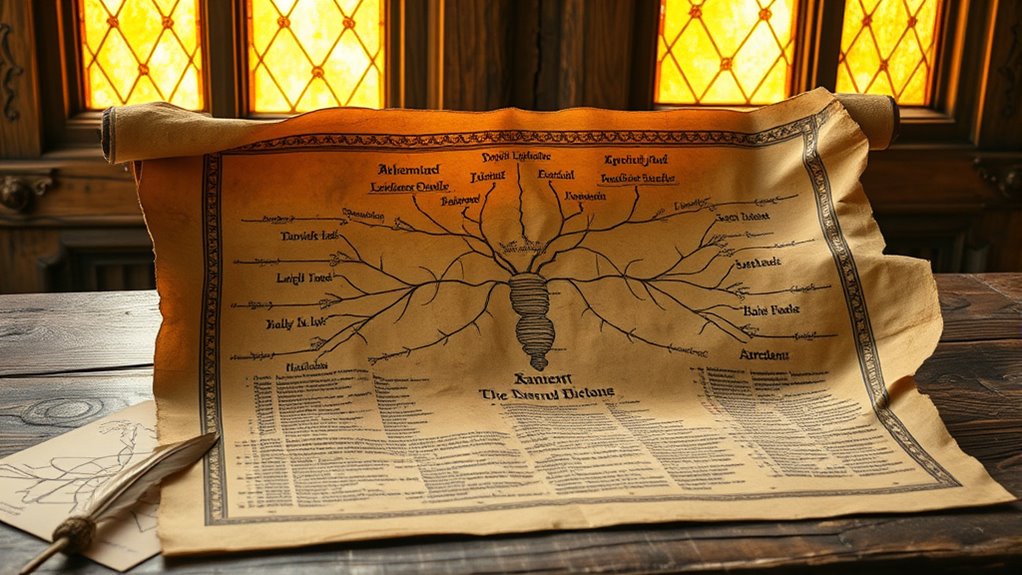Jesus’ genealogy matters because it connects him to God’s promises and key figures in Jewish history, confirming his identity as the Messiah. It highlights his link to David and Abraham, fulfilling ancient prophecies and strengthening his royal and spiritual legitimacy. Understanding his lineage helps you see how past promises come alive today. If you keep exploring, you’ll discover even more about how these roots shape his mission and your faith journey.
Key Takeaways
- Validates Jesus as the Messiah by fulfilling Old Testament prophecies through genealogical lineage.
- Connects Jesus to key biblical figures like Abraham and David, emphasizing His royal and spiritual heritage.
- Demonstrates God’s faithfulness across generations, linking past promises to present faith.
- Reinforces the legitimacy of Jesus’ claim to divine authority and messianic role.
- Highlights cultural and historical significance, enriching the understanding of Jesus’ mission and identity.
Uncovering the Roots: Tracing Jesus’ Ancestry

Tracing Jesus’ ancestry reveals a complex lineage that connects him to key figures in Jewish history. You see, this lineage reflects diverse cultural influences, blending traditions from different periods and regions. These influences shape how Jesus’ story is perceived, adding layers of meaning rooted in history and culture. Literary symbolism also plays a role, as genealogies often serve as storytelling tools, emphasizing themes like divine promise and fulfillment. By understanding these cultural and literary elements, you gain insight into how Jesus’ roots are more than just names on a page—they symbolize continuity and hope for the Jewish people. This ancestral backdrop enriches your appreciation of his significance, highlighting the deep cultural and literary traditions that frame his identity.
Fulfillment of Prophecy Through Lineage

The lineage of Jesus serves as a powerful demonstration to the fulfillment of ancient prophecies, confirming his role as the promised Messiah. By examining genealogical methods used in biblical times, you see how lineage validated His messianic credentials. The cultural implications of tracing Jesus’ ancestry reveal the importance placed on fulfilling God’s promises through specific family lines. These genealogies underscore that Jesus’s lineage aligns with prophecies in Isaiah and Micah, emphasizing divine planning. They also highlight how genealogical methods, such as oral traditions and written records, preserved these essential details across generations. Recognizing this connection helps you understand that Jesus’s lineage isn’t just a family tree but a divine blueprint confirming His messianic purpose and God’s faithfulness to His promises.
The Significance of Jesus’ Davidic and Abrahamic Lineages

Jesus’ genealogies highlight two key lines that anchor his identity and mission: the Davidic and Abrahamic lineages. These lineages carry significant cultural implications, linking Jesus to the promises made to Abraham and King David. Understanding the historical context shows how these connections affirm his rightful place in Jewish tradition and messianic expectation. The Davidic line emphasizes his royal lineage, fulfilling prophecy and reinforcing Jesus’ role as a king. The Abrahamic connection underscores his role in blessing all nations, emphasizing universal significance. Recognizing these lines helps you see how Jesus’ ancestry is rooted in foundational biblical promises, shaping perceptions of his mission and authority within the cultural and historical landscape of his time. This lineage affirms his legitimacy and purpose.
How Genealogy Reinforces Jesus’ Identity as the Messiah

Because genealogies serve as essential evidence of Jesus’ rightful claim to the messianic title, they reinforce his identity as the long-awaited Savior. These genealogies carry significant cultural implications, demonstrating Jesus’ connection to key biblical figures and fulfilling ancient prophecies. When genealogical accuracy is maintained, it confirms that Jesus belongs to the royal lineages of David and Abraham, validating his messianic credentials. This historical credibility reassures you that Jesus’s claim isn’t arbitrary but rooted in fulfilled promises and established traditions. The detailed lineage underscores the importance of lineage continuity in Jewish culture, emphasizing that Jesus’s heritage aligns with expectations of the Messiah’s ancestry. Ultimately, it solidifies his role as the fulfillment of God’s divine plan across generations.
Connecting Past Promises to Present Faith

Connecting past promises to present faith reveals how God’s long-standing covenant with His people continues to shape your spiritual journey today. Cultural traditions often honor genealogical research, linking you to ancestors who trusted God’s promises. Understanding Jesus’ genealogy helps you see how God’s faithfulness spans generations, fulfilling His commitments from long ago. These connections remind you that God’s covenant isn’t just history; it’s alive in your faith today. By exploring genealogical records, you gain insight into God’s plan unfolding through history, strengthening your trust in His promises. Recognizing these links encourages you to remain steadfast, knowing that God’s faithfulness endures. Your faith becomes a living testimony of God’s ongoing commitment, connecting you to a divine story that started centuries ago and continues through you today.
Frequently Asked Questions
How Does Jesus’ Genealogy Compare Across Different Biblical Texts?
You notice that Jesus’ genealogy varies across biblical texts due to discrepancies and textual variations. In Matthew, the genealogy traces Jesus’ legal lineage through David’s son Solomon, emphasizing royal descent. In Luke, it follows a different line through Nathan, highlighting biological descent. These discrepancies reflect different traditions and purposes in each account, showing how textual variations shape our understanding of Jesus’ ancestry and significance.
What Cultural Influences Shaped the Recording of Jesus’ Lineage?
Imagine your family tree as a tapestry woven with cultural influences, each thread representing traditions shaping how you record lineage. You see, genealogical traditions reflect the society’s values and history, influencing how Jesus’ lineage was documented. Cultural influences like Jewish customs and Roman societal norms shaped the recording process, emphasizing ancestral importance and societal status. These traditions help you understand the deeper context behind the lineage, connecting history, faith, and cultural identity.
Why Are Some Generations Omitted in the Genealogies?
You might wonder why some generations are left out in genealogies. Family traditions often focus on highlighting specific ancestors or significant figures, leading to genealogical gaps. These omissions help emphasize important lineage milestones or fulfill theological purposes. By selectively recording ancestors, the record becomes more meaningful, reinforcing cultural values or religious messages. So, gaps aren’t accidental—they serve a purpose, shaping how future generations understand their heritage and identity.
How Does Jesus’ Genealogy Impact Christian Theological Debates?
Your understanding of Jesus’ genealogy shapes Christian theological debates by reinforcing Messianic expectations and tribal identity. It shows how Jesus fulfills Old Testament prophecies, affirming his role as the promised Messiah. The genealogy also highlights his connection to David and Abraham, emphasizing his rightful place within Jewish tribal identity. This impacts debates about Jesus’ divine authority and his significance in salvation history, anchoring core beliefs in lineage and prophecy.
What Role Does Genealogy Play in Modern Christian Practice?
Your family history and spiritual heritage shape your faith journey more than you realize. Genealogy plays a essential role in modern Christian practice by deepening your understanding of spiritual roots and God’s promises. It connects you to a divine lineage, enriching your sense of belonging and faith. By studying these roots, you gain insight into your spiritual inheritance, inspiring you to live out your faith boldly and authentically every day.
Conclusion
Understanding Jesus’ genealogy gently reveals the delicate threads of promise woven through history, connecting you to divine intentions. It’s as if the past softly whispers, affirming your place within a sacred story. Recognizing his lineage deepens your faith, subtly reminding you that the fulfillment of divine promises continues to guide and inspire. In this quiet assurance, you find a timeless link, encouraging your journey with hope and trust in the unfolding plan.










